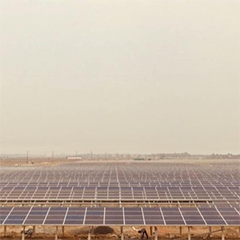United Kingdom (3 July 2018): PROINSO, a global leader in the solar energy market has supplied a 28 MWp utility scale project in Bangladesh, the first of its kind in the country.
PROINSO UK has been working in partnership with Joules Power Limited (JPL) on a 28 MWp utility scale project, utilising an innovative financing solution from GuarantCo, part of the Private Infrastructure Development Group (PIDG), and supported by the governments of the UK, Switzerland, Sweden, the Netherlands and Australia. The project is a demonstration of both PROINSO’s business philosophy and global capabilities in solar projects. PROINSO believes that strong collaboration between global and local businesses and institutions is key to achieving long-term sustainable growth and reaching renewable energy targets, as defined by the Paris Agreement.
Technaf Solartech Energy Limited (TSEL) is the first utility scale solar project in Bangladesh delivered within the 1.6 GW solar project pipeline announced last year. The project is located in Teknaf, a sub-district of Cox’s Bazar, in the Division of Chittagong. It forms the southernmost point of mainland Bangladesh and has a population of over 200,000.
The solar PV plant has an installed capacity of 28 MWp. The expected annual yield for year one is 43,000 MWh and at peak production the plant supply will cover up to 80% of the present electricity demand of the entire Teknaf region. The reduction in CO2 emissions over the next 20 years is estimated to be around 400,000 tons.
Project funding has been secured through debt finance by Standard Chartered Bank (Bangladesh and UK) and One Bank (Bangladesh). PIDG company GuarantCo, is working with the project parties to be able to provide an unconditional credit guarantee for over 50% of the project debt. On the successful reach of financial close the loan tenor is expected to be extended to 15 years for both local currency and USD debt. With the implementation of this pioneering funding solution, GuarantCo will be providing a risk guarantee for a significant portion of the TSEL project debt.
Bangladesh, the export-oriented country whose economy is growing at 7% Year-on-Year, is already facing electricity shortfalls. Rising electricity demand is projected to reach 34,000 MW by 2030 while the installed generation capacity is currently around 16 GW. In order to help boost economic growth the Government of Bangladesh is planning to increase power generation beyond expected demand with total investment in the sector estimated at $70.5 billion. According to recent media reports Bangladesh is planning to diversify its energy mix, currently heavily based on natural gas, by increasing the share of renewable energy to 10% by 2020.


























